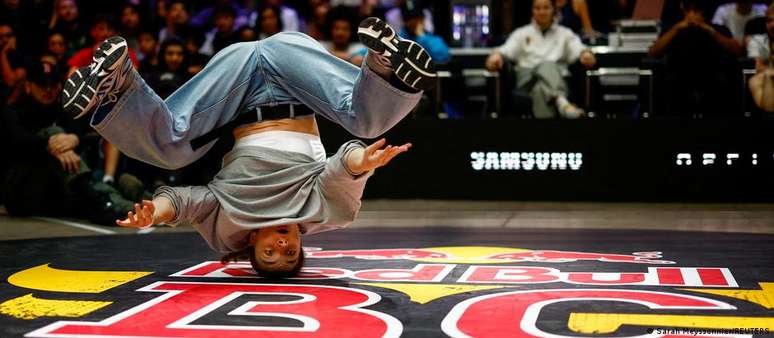Under the name “breaking,” a sport that originated in the black community in the United States will make its debut at the 2024 Games. Its inclusion has sparked controversy within and outside the dance community. In a matter of weeks, breaking will debut at the Paris 2024 Olympic Games – a meteoric rise for an activity that barely existed fifty years ago.
Breaking as it will be played at the Olympics became popular in the United States in the 1970s. This form of expression originated in the lively black street parties of the Bronx borough of New York, when dancers improvised stylized moves and spins to the sound of DJs.
The acrobatic dance style quickly became one of the four pillars of hip hop culture, along with “DJing” (the technique of selecting and mixing music), “MCing” (rapping or the use of rhythmic speech), and graffiti.
The dancers were known as “b-boys” and “b-girls” and their practice was more than a sport; She also helped build community.
From the streets to the main stage
Although breaking became increasingly popular in the late 1970s and early 1980s, the activity was not necessarily recommended by experts.
According to a 1984 New York Times article, “several doctors” warned that “fad fashion” was dangerous because it could “push the body beyond its endurance, causing torn ligaments, broken bones and even more serious injuries.”
“If the dancers are not in shape or do not have the flexibility of young dancers, doctors say they could suffer serious injuries,” the North American newspaper reported.
But such arguments would not stand in the way of inclusion on the Olympic Games list, as the international competition includes a number of sports associated with high injury risk, such as boxing and BMX cycling racing.
How Breaking Became Popular
In the same year as the NYT article, the New York City Breakers (a group formed in the Bronx) performed for US President Ronald Reagan during the 1984 Kennedy Center Honors. While the show was broadcast nationally, the performance extraordinary reached millions of people throughout the world and the United States.
As the popularity of the break grew, so did its competitive element. Battles between rival teams or individual dancers became a central part of the culture, with performers competing against each other to showcase their skills.
Dance battles have also become a great alternative to other temptations or provocations on the streets of New York. Spontaneously, it was through popular culture and the Billboard music charts that dance has shined.
Among the most notable successes is Run-DMC’s 1983 debut single, “It’s Like That,” which was remixed in 1997 by house DJ Jason Nevins and became an international hit. The video, which featured male and female break teams competing against each other, also inspired people around the world to learn the moves.
The first international competitions took place in the 1990s, popularizing the dance as demands grew for its inclusion in sporting events.
In the 2000s, discussions began for the inclusion of breaking in the Olympic Games. In 2018, a major step forward in this regard was the inclusion of the sport in the Youth Olympic Games, in Buenos Aires, Argentina.
A year later, in 2019, the Paris 2024 organizing committee proposed including the break in the Olympic program for the first time. In late 2020, the sport was confirmed for the 2024 Games by the International Olympic Committee (IOC).
Controversial inclusion
Breakers pushed for the inclusion of competitive-style dancing, arguing that the sport’s high entertainment value makes it an attractive addition to the Olympic Games.
“It will be great for the break, because it will give us more recognition as a sport,” British dancer Karam Singh told the BBC after the IOC announcement. “And for the Olympic Games, it will attract young people who may not follow some of the traditional sports.”
However, skepticism remains regarding the justification for its inclusion, with opinions ranging from puzzlement to indignation.
And while the inclusion of breaking in the Olympic Games is widely celebrated by the community, there are also those who fear that the dance is becoming too mainstream, too commercial for the general public.
Part of the community fears that the Olympic Games will lead to a loss of authenticity and the devaluation of the more subjective aspects of disruption, such as originality and enthusiasm.
“There was a bit of controversy within the scene,” b-girl Logan “Logistx” Edra told US newspaper USA Today. “It’s basically about ensuring the preservation of essence and culture [do breaking]”, added the Olympian, “and may this not be lost as we progress and take steps towards the Olympic Games.”
Source: Terra
Rose James is a Gossipify movie and series reviewer known for her in-depth analysis and unique perspective on the latest releases. With a background in film studies, she provides engaging and informative reviews, and keeps readers up to date with industry trends and emerging talents.







